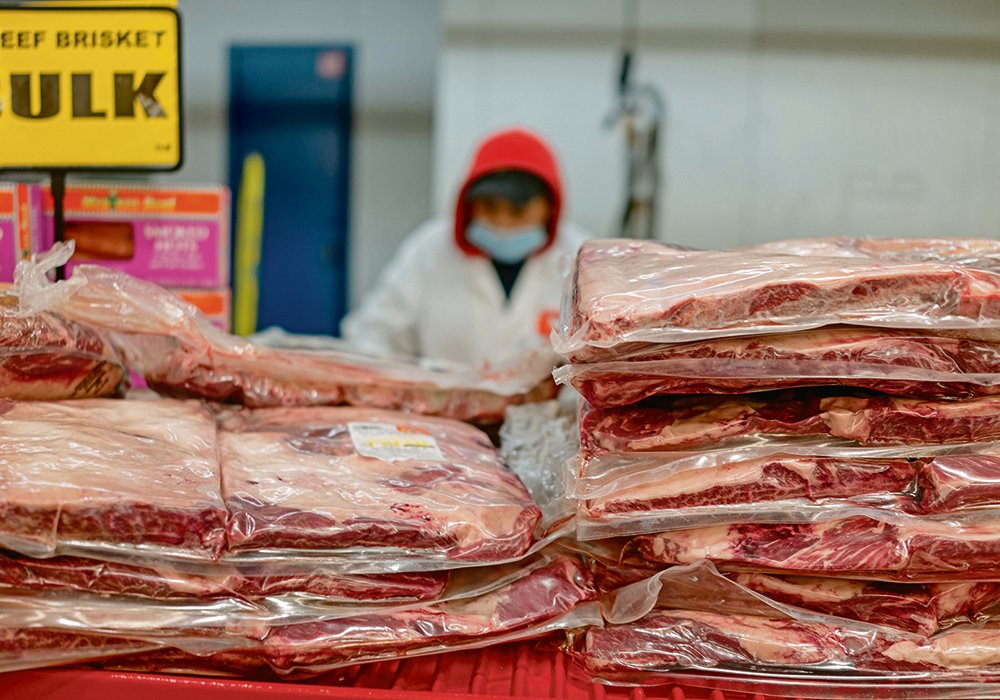Biden to rein in meat prices

WASHINGTON, D.C. (Reuters) — United States President Joe Biden’s administration plans to take a tougher stance toward meat packing companies it says are causing sticker shock at grocery stores.
Four companies control much of the U.S. meat processing market, and top aides to the president blamed those companies for rising food prices.
As part of a set of initiatives, the administration will funnel US$1.4 billion in COVID-19 pandemic stimulus money to small meat producers and workers, administration aides said in a blog post. They also promised action to “crack down on illegal price fixing.”
Four companies slaughtered about 85 percent of U.S. grain-fattened cattle that are made into steaks, beef roasts and other cuts of meat for consumers in 2018, according to the most recent data from the U.S. Department of Agriculture.
The big four processors in the U.S. beef sector are: Cargill, a global commodity trader based in Minnesota; Tyson Foods Inc., the chicken producer that is the biggest U.S. meat company by sales; Brazil-based JBS, the world’s biggest meat packer; and National Beef Packing Co., which is controlled by Brazilian beef producer Marfrig Global Foods.
Tyson Foods, which sells beef, pork and chicken, rejected the White House’s assertion that consolidation in the meat-packing sector is driving up prices. The company blamed the pandemic and a labour shortage for limiting production.
“Tyson’s scale allows it to operate efficiently, which keeps costs down for consumers,” the company said.
Cargill, JBS and National Beef made no comment.
“Issuing inflammatory statements that ignore the fundamentals of how supply and demand affects markets accomplishes nothing,” said Mark Dopp, chief operating officer for the North American Meat Institute, an industry group that represents meat packers.
Price increases in beef, pork and poultry have driven half of the increased prices Americans have paid for food they eat at home since December, the White House said. The administration sees those companies collecting too much profit after the stimulus helped prop up demand for their products.
“We’ve helped sustain this market, and it’s frustrating to see these companies turn around and raise prices,” Bharat Ramamurti, deputy director of the White House’s National Economic Council, said in an interview. “What we see here smacks of pandemic profiteering and that is the behaviour the administration finds concerning.”
The U.S. Consumer Price Index (CPI) showed beef and veal prices in July were up 6.5 percent from a year earlier, while poultry prices were up 5.3 percent and pork prices were 7.8 percent higher. Last year’s jumps in poultry prices were the most since 2004 and the most since 2014 for beef and veal as well as pork.
Rising inflation has posed a serious threat to Biden’s efforts to get a grip on the COVID-19 pandemic and engineer an economic recovery from the recession it caused.
The administration has responded partly by ramping up efforts to crack down on what it sees as anticompetitive and monopolistic behaviour that could be increasing prices.
The USDA and the Department of Justice have already been conducting an investigation into price-fixing in the chicken-processing industry.
“The goal of that over time is to bring these prices down,” said Ramamurti.
U.S. lawmakers are seeking increased oversight of the beef sector as concerns about anticompetitive behaviour increase after the pandemic and a cyberattack on JBS USA.
Source: www.producer.com

